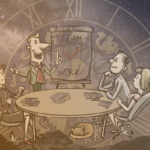An electrifying marketing stunt
After more than 160,000 miles, our Volkswagen Passat is showing its age – unsightly dents and odd grumbles from the trusty engine that is yet to break down – so I reluctantly started to research a replacement. And that meant shock horror, contemplating an electric vehicle (EV) with its silently efficient battery power rather than the joyful wonder of a petrol engine.
I’m not sure why we car owners are so loyal, but we are. Which is why I fired up the laptop and started investigating Volkswagen and EVs. The ID.3 and e-Golf emerged as leading contenders but, among all the search results, there was one which reminded me of my favourite marketing story of the year: VW’s apparent name change from Volkswagen of America to Voltswagen of America.
Was it a brilliant April Fools’ joke that went viral or a blunder that has left a nasty dent in its reputation?
On March 29, the company posted a press release trumpeting it was changing its US brand name to Voltswagen of America to show how much it was focusing on EV production. The release was dated 29 April, not 29 March, and wasn’t quite finished. Then it was taken down. Canny. Believable.
Volkswagen to Voltswagen
The YouTube, Facebook and Instagram channels of VW USA were renamed Voltswagen USA. Jochen Sengpiehl, the VW Group CMO, wrote on his LinkedIn: “Volkswagen of America are making their motivations clear with their recent name change into Voltswagen. We fully support it. Electric isn’t just the future, it’s the right now. Please share to everyone.”
It was certainly plausible. On March 15 Herbert Diess, the CEO of Volkswagen, held a glitzy news conference called Power Day. No prizes for originality; Tesla’s big celebration is Battery Day. He claimed there is only one way to quickly reduce emissions from transportation – electric vehicles.
The name change was taken seriously by, among others, USA Today, The Times, the New York Post, The Wall Street Journal, Reuters, CNBC, Bloomberg, all the major car magazines and, of course, people on Twitter. The Wall Street Journal even reported that the news pushed up VW’s stock price. It’s a big deal. The VW Group includes VW, Audi, Seat, Skoda, Bentley, Bugatti, Lamborghini and Porsche.
Eventually, VW US did admit it was all a stunt in the “spirit of April Fools’ Day”, but pranked media outlets were scathing. They reminded readers it was another example of untrustworthiness. Remember Dieselgate? In 2015, VW revealed it had sold 11 million vehicles fitted with software that cheated pollution tests in a lab but then increased emissions on the road. It had to stump up more than $30bn in fines and compensation.
The Securities and Exchange Commission and April Fools’ Day!
In a way, the bad news continued. The United States Securities and Exchange Commission (SEC) decided to investigate the “Voltswagen” furore, according to Der Spiegel, to see how the stunt might have affected the automaker’s stock price. Had VW – the “wagon of the people” – broken any securities laws?
However, I can’t help thinking it’s a triumph. Fame – and being talked about – is almost always a good marketing strategy. And VW got talked about for a whole variety of reasons, and almost all of them positive as far as the car-buying customer is concerned.
First of all, this was not a general form of fame for fame’s sake. It was specific and strategic. VW, the brand, was suddenly much more closely linked to the all-important EV. Yes, Tesla is the EV, but VW is arguably now the leading traditional automaker in the space. Last year, VW Group was already the biggest EV maker in Europe. Of its 9.3 million sales, 231,600 were EVs.
Secondly, you have to admire the structure of the campaign. No sooner had unwitting journalists printed stories revealing VW was changing its name than they had to print stories revealing VW was not changing its name. It was all an April Fool. Yes, they were critical, but car fans would love that fact they all got duped. I did.
And the story rolls on. Always bringing a smile. I bet the VW marketing team is smiling too… in private. Fame (unless its notoriety) works, and it certainly helps maximize marketing budgets because the all-important consumer happily does lots of the most valuable work. Word of mouth works wonders. Even so, despite the VW-EV coverage, I’ve decided to give my Passat and its grumbling petrol engine one more glorious year.
In my next blog, we will take a look at ten great marketing stunts. It’s a fascinating and often hilarious list. In the meantime, if you would like to talk about your marketing or content strategies, we would love to hear from you. We can’t promise it will go viral, but we can guarantee it will help you to be noticed, understood and sought after!



